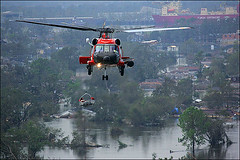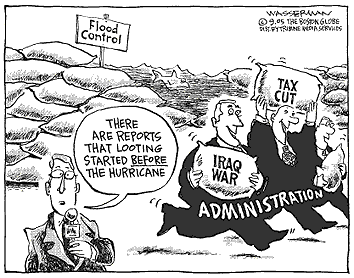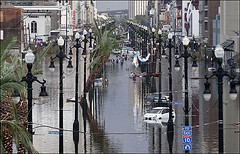Eventually, eating your seed corn has consequences
 A person was lifted to safety yesterday after Katrina's heavy rains and levee breaks at Lake Pontchartrain flooded about 80 percent of New Orleans. (Reuters Photo)
A person was lifted to safety yesterday after Katrina's heavy rains and levee breaks at Lake Pontchartrain flooded about 80 percent of New Orleans. (Reuters Photo)On the Main Street email list, a couple days ago someone sent a posting stating that part of the problem of response to the disaster in the Gulf region was the diversion of governmental resources and money to Iraq. This engendered quite a response from a number of people, stating that this was political and an opinion off track of commercial district revitalization.
Here's what I wrote today:
Interestingly enough, an article in today's Washington Post (OMB vs. Army Corps of Engineers: Critics Say Bush Undercut New Orleans Flood Control) and an editorial in yesterday's Boston Globe (Catastrophe) expressed the exact same sentiments of the original post that started this thread--underfunding of levee improvement and other protection needs in the Gulf region of the U.S., as well as underfunding of the Army Corp or Engineers.
There's also this editorial cartoon from today's Boston Globe.

I don't want to get into it, but the way "we" spend our money as a nation has consequences, particularly for cities vis-a-vis suburbs. In fact, the Main Street program has been one response to how dominant political, economic, and planning systems have favored new development and the suburbs over traditional center cities and towns.
Today's Post has an excellent column by E.J. Dionne about how govenment is trashed when not needed and welcomed when needed. The constant tax cutting agenda of the prevailing party leads to a massive underfunding of infrastructure. When Government Is 'Good' is the op-ed piece.
From the piece:
The sight of rescue workers, the police and the Coast Guard, governors, mayors, and federal officials struggling desperately with the devastation wrought by Hurricane Katrina brings to mind Cohen's Law: "Government is the enemy until you need a friend." Bill Cohen, the former defense secretary, minted the phrase nine years ago when he was a Republican senator from Maine. He was speaking then of a plane crash and the public's hankering for more effective safety regulation. Cohen's point was that government-bashing is easy in good times for those doing just fine. But when disaster strikes, many turn around and ask why government didn't do more to prevent a catastrophe -- or why it wasn't doing more to relieve its effects....
It turns out that our individual striving goes on within a web of social protections that we take for granted until they disappear. We rely on each other more than we know. The rich, the middle class and the poor -- all of us -- bank on law, government, collective action and public goods more than we ever want to admit. The dreaded word "infrastructure" puts people to sleep at city council meetings and congressional hearings. But when publicly built infrastructure -- those levees that held for so many years -- breaks down, we realize that the things that seem boring and not worth thinking about are essential.
How can we look Katrina's victims in the eye, say we care and yet not take account of how their needs should affect the other things government does? I'm sorry to raise this, but can it make any sense that one of the early issues the U.S. Senate is scheduled to confront this month is the repeal of the estate tax on large fortunes when we haven't even calculated the costs of Katrina? And why do we keep evading a national debate over who is bearing the burdens of a war that has dragged on far longer than its architects promised?
Katrina is the work of nature, but what happens from this point forward is the responsibility of political leadership. Is it possible that in the face of a catastrophe of this magnitude, Washington will not even bother to rethink our nation's priorities?
Such decisions have consequences and people in the south are paying for it now. Or, when you eat your seed corn, what do you do next season when the time comes to plant?
 Canal Street was flooded a day after Hurricane Katrina blew through New Orleans. (Getty Images Photo / Chris Graythen)
Canal Street was flooded a day after Hurricane Katrina blew through New Orleans. (Getty Images Photo / Chris Graythen)



0 Comments:
Post a Comment
<< Home